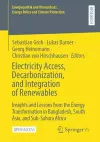
Electricity Access, Decarbonization, and Integration of Renewables
4 contributors - Paperback
£34.99
Georg Meran is a Professor of Environmental Economics at Technical University of Berlin (TU Berlin), Germany, and Research Fellow at the German Institute for Economic Research (DIW Berlin), Germany, specializing in applied microeconomic and institutional aspects of water. He holds a PhD from the Free University of Berlin, and has served as Dean of the DIW Berlin Graduate Center for Economic and Social Sciences (2004 – 2010), and as Dean of Studies at the Faculty of Economics and Management, Technical University of Berlin (2008 – present). Prof. Meran has published extensively on various environmental issues, allocation of water rights, pricing, nudging, energy economics, regulation issues, etc. He teaches an undergraduate course on fundamentals of environmental and resource economics, courses on advanced environmental economics as well as ecological economics, and a course on water economics, the content of which provides the basis for this textbook. Markus Siehlow is a Senior Researcher at the Workgroup of Environmental Economics at Technical University of Berlin (TU Berlin). His specialization is in the field of water economics, such as transboundary water management and industrial economics of the water sector. He works also on the field of resource, ecological and environmental economics. Together with Georg Meran, he gives courses in these economic disciplines. His PhD thesis focus on the topic of hydro-economic modeling, where methods from Operations Research are applied to the water sector. Christian von Hirschhausen is a Professor of Infrastructure Economics at Technical University of Berlin (TU Berlin), Germany, and Research Director at the German Institute for Economic Research (DIW Berlin), Germany. His research covers various infrastructure sectors, e.g., water, transportation and energy. His most recent publications have been on regulatory issues and pricing, and include a compilation on “Water - Economics and Management of a Key Resource” (DIW Berlin, 2010).